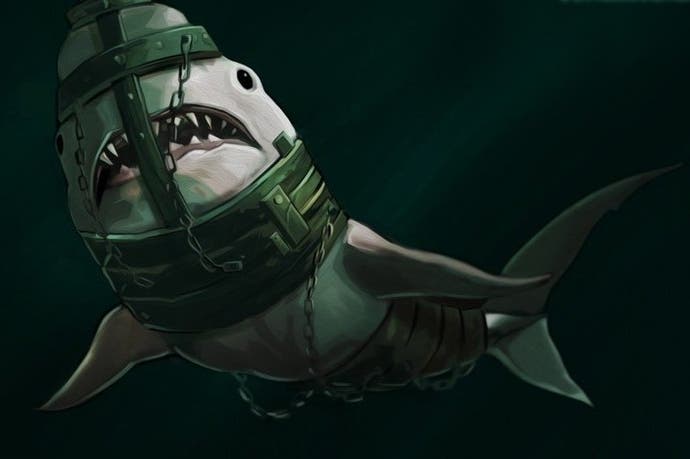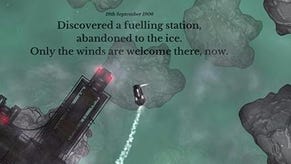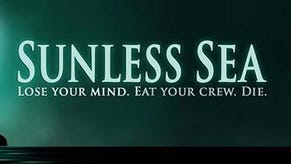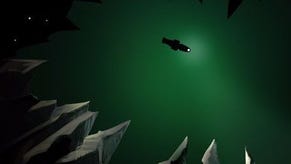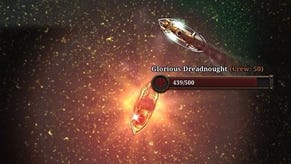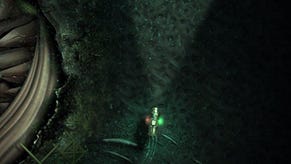Sunless Sea review
Hello sailor.
Do you keep the trinket or cast it into the water? It would be a symbolic gesture, sure, but the ripples through your story will be genuine. Drop the keepsake back into your pocket and you'll be keeping the preposterous promises made to a young lover after a drunken night together. Drop the keepsake into the sea and, eventually, she and it may be forgotten. Then you will be free to find refuge in the next warm and welcome body (and, so long as you make to back to port, there is always another).
If a game is a series of meaningful choices, as per the designer Sid Meier's oft-repeated, oft-abused maxim, then Sunless Sea is more game than most. The choices pile up quickly, then escalate. Sure, you're a merchant captain now, but who were you before that? Poet? Priest? Veteran? Urchin? And by what measure would you consider this new life a success? By discovering your dead father's remains? By becoming a well-regarded travel writer? By dying wealthy? Who will serve as your crew in this endeavour? Do you care about their personal hopes and ambitions? Do you care enough to help them out and, when the time comes, free them from your trade?
What trade is that, anyway? Smuggling? Piracy? Exploration? Haulage? There's nothing so crude as a class to pick in Sunless Sea. Rather, the lines between each way of life are traversable. Decisions will lead you down certain paths, some of which cannot be returned from, but it's entirely possible to keep smuggled goods, stowaways and legitimate cargo in your hold to make the most of a trip.
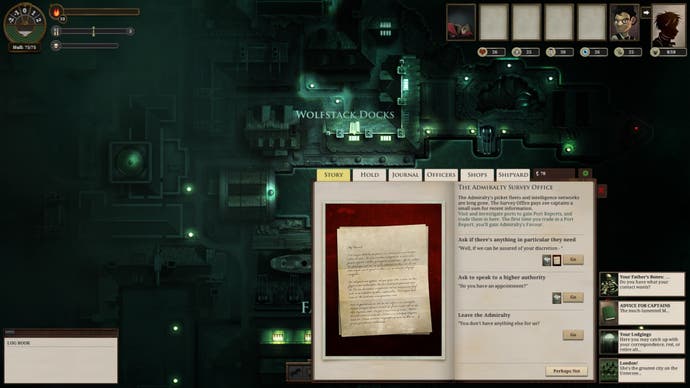
Okay, says Sunless Sea, more gravely now. When the money runs out and you're 50 miles from home and the food is gone and disease is everywhere and your engines finally sputter out, in the darkness as you hear the monsters rounding, will you cook and eat your first mate? If you don't, your girl back home may never know whether her heart was already broken before it was broken.
It's the 1800s and London has fallen into the ground. As the soil overhead closed (Essex: meet Surrey), a twilight and subterranean archipelago landed a mile below. Here in the luminous ocean, known as the Unterzee, the map is unfamiliar. Gone are London's boroughs, replaced by islands that go by new names. Some are archaic: Pickett's Bluff, Watchmaker's Hill, Lick-a-Monkey Crag. Some are futuristic: Station III, Codex. Others are just playfully wistful: Low Barnet.
You'll want to visit them all, you and your crew. Regardless of whether you're in the business of trading goods, stories, or blows, your livelihood depends upon travel. Indeed, while the geography surrounding Fallen London is unfamiliar, the question that greets you here is common to all who come to the city: where are you headed?
This is an exploration game at its core, then, about questing into the unknown, penetrating the darkness of unfamiliarity in search of new places, stories and truths. Your range is naturally limited, however. Your ship is only able to carry so much fuel and supplies and, until you're able to afford a larger vessel, it's best to keep within sprinting distance of home. Run out of either and the choices you will face are unthinkable. The balance of risk and reward, therefore, is built into the geography.
Great stretches of water are landless so you soon learn to rely upon your zee-bat scout, who can be sent out like Noah's black dove to return with news of nearby lands. If the scout returns successful it will place a vague mark on your map. Find the place for yourself and you can dock there and meet the locals to find out more about their lives. This knowledge can then be sold back in London.
Soon the intense rhythms of long-term sea travel are established: the thrill of departure, the exhilaration of discovery (tempered, always, by the fear of the unknown), the excitement of learning new stories and scraps of news, the creeping dread as supplies dwindle, the relief - the glorious, blessed relief - of arriving home again, beleaguered but alive. Then, after nights drinking at bars, selling supplies, trading those stories, you begin again to feel the call of the sea, the draw of all that horror and gain it promises.
The story, which accumulates from a thousand fragments and diversions of your own choosing, is communicated by snippets of delightful text. There is a lot of reading to be done here, but the writing is lively, subtle and never indulgent. "Ah yes," says London's admiral, the first time you're granted an audience. "The merchant-captain of whom we hear such complicated things." Complicated! Yes, the perfect word.
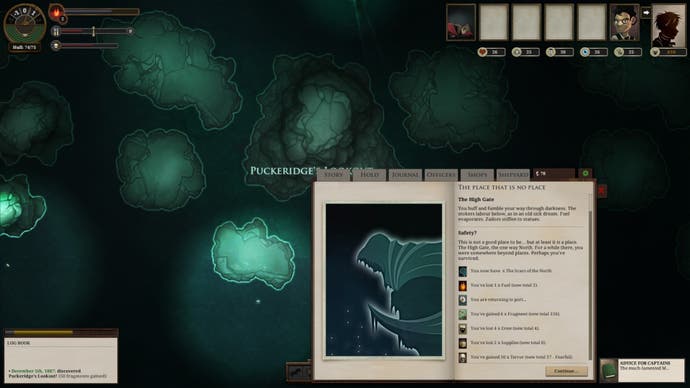
Choices are often pinned to the bottom of these pieces of dialogue and description. Will you, for example, loot a host's home, or search for clues as to their past? The choices available to you depend on your current attributes, which quantify your aptitude for healing and morale, detection and perception, trickery and knowledge or blunt attack power. Some islands have stories that unfurl only over multiple visits. In time, checking in with your favourite communities en route to more perilous and unknown locations becomes a treat.
These warm interactions are valuable because the Sunless Sea is an otherwise relentlessly hostile place. You will often be attacked while sailing and, in these instances, you must choose whether to fight or flee. Fight and your deck gun's range is shown as a red circle with your ship at its centre. Shine your ship's prow lamp on to the enemy and the crew will ready a shot more quickly. Once you've defeated your enemy, be it a vast shark wrapped in belts (Lovecraft is everywhere, down here in the Unterzee), or a nimble pirate ship, you can salvage from the remains food, cargo or knowledge. As you begin to earn a living you can upgrade various parts of your ship according to your favoured style of play. Blow everything on the most expensive engine on the market and you'll be able to outrun most attackers. Or pick out the latest cannons and meet them head on. Maybe, if you're more of a family man, woman (or oligarch) a London penthouse might seem like a better way to spend your money.
As well as the financial choices set before you and the decisions you must make about what kind of captain you are there are philosophical choices: do you worship the Ur-gods here on the dim sea, or remain stoic in the temptation of superstition? Then, there's the question of legacy. Death is not the end in Sunless Sea. You are able to pass on scraps of your life to the next comer, an inheritance of your choosing: the chart you so carefully drew (perhaps the most valuable of all assets), your knowledge, cunning, strength or skill. With the passing of each new life there is grief but also opportunity. You are able to try different choices in order to see where they lead you, rejecting the path laid down by your predecessors, just as a child rejects the choices of the parent in order to create a space in which to grow distinct.
As well as your self-described ambition in the game, there are other secrets to unravel and settle about the Unterzee. Find the right mooring and it may be possible to return to England's surface ("a warmer place"). And what is The Dawn Machine? Who lives in the Kingeater's Castle? Even if you decided to chase wealth for your character at the expense of all else, often these peripheral conundrums prove irresistible distractions. They are secrets that can be unravelled through generations of character, each playthrough bringing further insight.
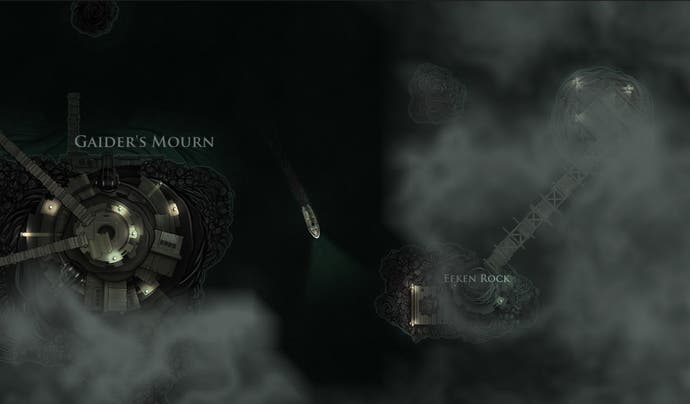
Sunless Sea's method of storytelling isn't unique, but it has never been realised with such impact and elegance. Every playthrough is singular because it's composed of the fragments of your decisions. A writer hasn't pre-laid a narrative for you to trace. They've simply created scenarios and opportunities. It's broadly up to you how your chosen beats of drama link together. You are the architect of your victory or downfall, the only one that must live or die by the consequences of your actions.
This is the video game at its most mystical and revealing. It exposes much human juxtapositions: our elemental longing for exploration and discovery, and the tension with our common desire for home and sanctuary. It reveals the way in which we will imperil ourselves in the quest to gain knowledge for the greater good, set against our selfish instinct to hoard and sell that knowledge for personal gain.
Sunless Sea is a game about transport in another way too: it takes us to another, currently vanished period in human history. It's fictional and yet it's also representative of a time when this kind of travel was at once essential, burdensome and perilous.
Through play you start to learn the ancient principles of captaincy and leadership. You learn how to plot a feasible voyage (for a start: don't waste your money on wine and women till you've first bought fuel and supplies for the next trip). You learn first hand the tremendous cost of a miscalculation, and how, on the capricious sea, you can never be fully in control. You become more decisive, especially of what to keep and what to discard (there is no time for equivocation, no room for hoarding, you tell yourself, as the keepsake sinks). You learn, as they used to say, how to run a tight ship. And in that journey, Sunless Sea holds a mirror up to your own temperament, character and approach to life.
'The sacred river ran, through caverns measureless to man, down to a sunless sea,' reads Coleridge's poem, Kubla Khan, from which the game takes its name and setting. It already knows that you will take up the challenge and bravely attempt to measure these caverns. The better question, and the one that Sunless Sea asks in countless ways is: how?
